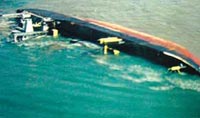
MV Black Rose
Ships carrying metallic ores should be the most stable ships on the ocean. These cargoes are dense and carried in low the ship. If improperly loaded, ore cargoes can indeed break a ship in half, but stability should not be an issue. Nevertheless, three ships carrying nickel ore have capsized over a period of only 39 days with the loss of 44 officers and crew.
While the investigations into the sinking are still ongoing, the problem is apparent, well known and yet obviously unheeded. Now new warning bells are going off across the industry. The problem is simply wet ore. Many fine particle metallic ores; including iron, nickel and fluorspar; can soak up substantial quantities of water if left exposed to the weather. Once loaded and under way, the water can begin to separate out from the ore, creating a watery slurry. The sloshing of this slurry dramatically reduces the stability of the ship and may lead to a sudden capsize. The entire process can take only a matter of minutes. The outcome is both obvious and tragic.
As reported by Intertanko, the three ships which sunk were remarkably similar in many respects. The Jian Fu Star, which sank October 27th with 13 fatalities; the Nasco Diamond, which sank November 10th, with 21 lost and the Hong Wei, sinking December 3 with 10 fatalities, all:
- carried the same cargo – Nickel Ore
- loaded in the same country – Indonesia,
- in Chinese operated and manned ships,
- under the Panamanian flag,
- sank in broadly the same location,
- and all were bound for the China for use in the Chinese steel industry.
They were sadly not the only ships to have capsized due to wet ore. Last year, we posted about the MV Black Rose which loaded a cargo of iron ore that had been sitting in a terminal through monsoon rains. The ship capsized before even leaving Paradip harbor. Likewise the MV Asian Forest loaded iron ore last year in India and developed a dangerous list only two hours after leaving port. The crew abandoned ship before the ship capsized and sank.
This is obviously not a new or unknown problem. Under the IMO Bulk Cargo (BC) Code the shipper is obligated to ensure that the cargo to be loaded is below the Transportable Moisture Limit (TML) for safe shipping. Sadly for the families of the 44 sailors who drowned recently when their ships capsized, rules are of little value if wholly ignored.
LIQUEFYING BULK CARGOES : OLD PROBLEM / NEW WARNING
Intercargo Warns of the Dangers of the Carriage of Nickel Ore Cargoes

Reminds me of the problem carrying wet coal that caused fires to ignite in the holds of the sailing ships.
Ah,finally, a tall ship reference!
I imagine the same problem exits on coal-carrying ships even now.